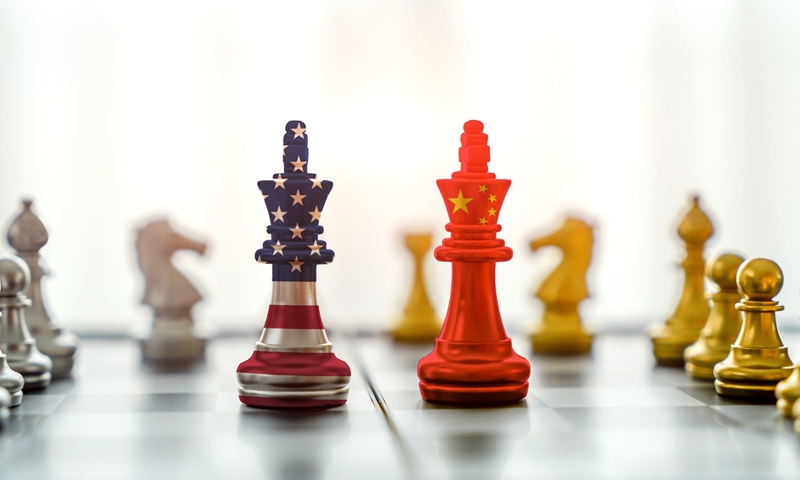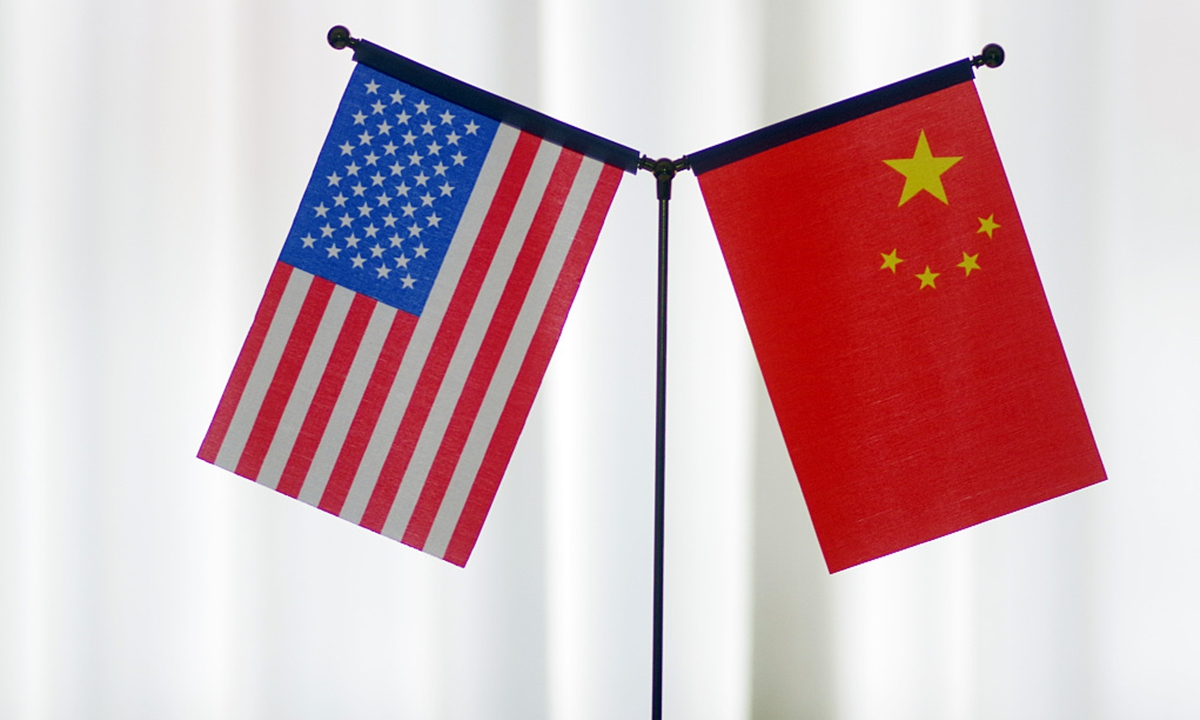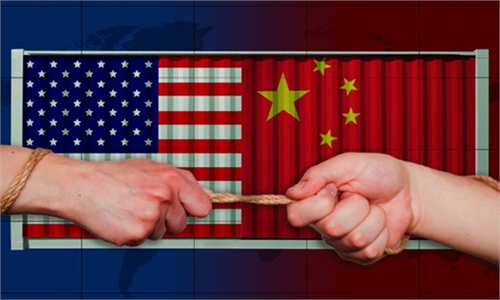Xi-Biden phone call positive sign amid fraught ties; signals growing US anxiety to seek China’s help
US should take actions to respect China’s basic interests, discard illusions of suppressing China while asking for cooperation

China US Photo:IC
Chinese President Xi Jinping on Friday told US President Joe Biden that the US' policies toward China have caused serious difficulties in bilateral relations and called on Washington to shoulder responsibilities to direct the ties back on the right track, in the first phone conversation between the two leaders in seven months amid escalating tensions and a series of regional and global challenges, including the US' hasty withdrawal from Afghanistan.
The phone call, which took place at the US' request, highlighted Washington's growing anxiety and need for China's cooperation on key global issues including climate change, COVID-19 fight, Afghan issues and economic recovery post the pandemic, analysts said. While the discussions sent positive signals that both sides are aiming to maintain communication, the US should take more action in correcting previous wrong deeds and respecting China's basic interests, and not expecting China to cooperate while keeping it as an adversary, analysts said.
Hours after the Xi-Biden call, Xi also spoke to German Chancellor Angela Merkel on the phone and noted the remarkable achievements brought by China-Germany ties and expressed hope for Germany to urge the EU to adhere to the right policies on China and properly handle differences.
Analysts said Xi talking to leaders from the US and Germany in one day was very rare and is of great significance, a sign of China advocating world multi-polarization, and it also revealed China's sincerity in working with all parties to solve bilateral and international issues.
In a statement released after the phone call by the Chinese side, it said the two leaders had candid, in-depth and extensive strategic communication and exchanges on China-US relations and relevant issues of mutual interest.
Xi stressed in the phone call that for some time, due to the US policy on China, the China-US relationship has run into serious difficulty. This serves neither the fundamental interests of the people of the two countries, nor the common interests of countries around the world.
"When China and the US cooperate, the two countries and the world will benefit; when China and the US are in confrontation, the two countries and the world will suffer," Xi said.
"Getting the relationship right is not optional, but something we must do and must do well," Xi said.
Biden noted that the US-China relationship is the most consequential relationship in the world, and the future of the bulk of the world will depend on how the US and China get on with each other. The two countries have no interest in letting competition veer into conflict.
Biden reiterated during the conversation that the US has no intention of changing its one-China policy. It is prepared to have more candid exchanges and constructive discussions with China to identify key and priority areas where cooperation is possible, avoid miscommunication, miscalculation and unintended conflict, and get US-China relations back on track.
The second phone conversation between the two leaders was held upon the invitation from the US and "upon the invitation from the US" was the phrase we recently saw in releases on communications between high-level officials of the two countries, Su Xiaohui, deputy director of the Department for International and Strategic Studies of China Institute of International Studies, told the Global Times.
US Secretary of State Antony Blinken held a phone call with Chinese State Councilor and Foreign Minister Wang Yi on August 29 in which the pair discussed the topics of Afghan issues and US Special Presidential Envoy for Climate John Kerry communicated with Wang via video link last week - all were made at the invitation of the US.
The US' willingness to communicate with China is very clear as the Biden administration is facing huge pressure domestically with crises on multiple fronts, Su noted.
Echoing Su, Li Haidong, a professor at the Institute of International Relations of the China Foreign Affairs University, said that the US requesting more dialogue showed that the Biden administration is under great pressure - it wants to compete with China while avoiding conflicts; it could not deal with some major global issues, including the Afghan issues and climate change without China but at the same time remains obsessed with weakening what they call the "strategic rival."
These contradictions have put Biden in a bind and have given China the upper hands in steering bilateral ties, Li told the Global Times.
The complicated domestic political situation in the US has also given Biden great headache as he may face more difficulties in promoting cooperation with China than upholding competition and conflicts with China. Whether Biden is able to avoid the competition turning into clashes remains a big question, Li noted.
However, the differences between China and the US when it comes to viewing bilateral ties were revealed in the public releases from each side-China insists that the bilateral cooperation has no alternative and must be achieved for the benefit of both sides, while the US pays attention to "conflicts" and is seeking to maintain controllable competition with China, Li noted.
In contrast, Xi told Merkel that the great achievement of China-Germany ties lies in building mutual respect and seeking common points while dealing with differences.
Analysts said that the main goal of the Xi-Biden call was to prevent disputes from spiraling out of control, as China-US relations have already hit bottom and the two have a long problems list--from trade to human rights. But the Xi-Merkel call was to resolve differences to push the EU to finally adopt the China-EU investment agreement and deepen cooperation in various fields.

China US Photo: VCG
More action needed
Friday's phone call was the second between leaders of China and the US since Biden took office. Xi took the first call from Biden on the eve of Chinese Lunar New Year.
While analysts reached by the Global Times agreed that Friday's phone call is a positive signal for the bilateral ties which has been at a low point due to US' provocative action toward China, they also urged the US to take more actions to promote relations.
The talk between top leaders of China and the US is timely and positive as the US has realized the need to listen to and face to China's role and expectations. After Biden took office in January, he has adopted Trump's tactics of suppressing China, undermining China's red line and straining China-US ties, Zhu Feng, director of Institute of International Studies of Nanjing University, told the Global Times.
During several rounds of "battle," including the meeting in Anchorage in March and Deputy Secretary of State Wendy Sherman's visit to Tianjin, China has made its stance clear that if the US did not respect the "two lists" and "three bottom lines," it should not expect China to cooperate while suppressing it, Zhu said.
When meeting with Sherman in Tianjin, Chinese Vice Foreign Minister Xie Feng presented her with "List of US Wrongdoings that Must Stop" and the "List of Key Individual Cases that China Has Concerns With."
Chinese State Councilor and Foreign Minister Wang Yi also drew three bottom lines on China-US relations when meeting with Sherman, including not to challenge, slander or even attempt to subvert the path and system of socialism with Chinese characteristics, not attempt to obstruct or interrupt China's development process, and not infringe upon China's state sovereignty or damage China's territorial integrity.
The Friday's phone call revealed that the two sides reached three points of consensus - both recognized the significance of communication and dialogue, expected the bilateral ties to be maneuvered back on the right track and both agreed to more cooperation, Liu Chang, assistant research fellow with the Department for American Studies at China Institute of International Studies, told the Global Times.
According to a release from China, the two leaders agreed to maintain frequent contact by multiple means and instruct officials at the working level to intensify the work, conduct extensive dialogue and create conditions for the further development of China-US relations.
"We hope that China and the US may have discussions over some concrete issues in the third and fourth quarter of the year, for example on trade talks - to correct willful policies made by former president Donald Trump. This would be a great encouragement to not only US companies but its customers," Lü Xiang, a research fellow at the Chinese Academy of Social Sciences in Beijing, told the Global Times.
The two militaries may also engage in dialogue given that US missile destroyers have been monitored illegally entering waters in the South China Sea, a provocative act, Lü noted, saying that more communications are needed to avoid future clashes.
US Guided-missile destroyer USS Benfold trespassed in waters near the Meiji Reef in the South China Sea Wednesday without permission from China. The Chinese side mobilized aircraft and ships to warn off and expel the ship from the waters.
Although the phone call set a basic tone for the long-term China-US relations, analysts said that they do not expect that a single phone call will solve the structural and complex contradictions facing China-US relations.
The statement of the White House did not mention specifics as released by the Chinese side, saying Biden made clear that the discussion was part of the "US' ongoing effort to responsibly manage the competition between the US and the PRC," and Biden underscored the US' "enduring interest in peace, stability, and prosperity in the Indo-Pacific" and the world.
White House's statement showed that US' China policy was still focusing on competition, confrontation and cooperation, and by specifically mentioning the Indo-Pacific region, Biden is also trying to pacify his allies, especially those in Europe that were angered by US' chaotic pullout from Afghanistan, and pave a way for his follow-up diplomatic moves in the upcoming "quad" summit this month, Liu said.
On the same day when the top leaders of China and the US had their phone conversation, Chinese Ambassador Qin Gang posted a picture on his Twitter account of himself talking with Henry Kissinger, the former US secretary of state who made a secret trip to China on July 9, 1971 and sparked a new era for the China-US ties.
The Chinese ambassador tweeted that "Had a great time with Dr. Kissinger and benefited a lot from his vision, wisdom and insights."
Zhu said that while the China-US ties are strained, more positive voices should be brought to the fore by US scholars and former officers who have real strategic insights. Kissinger is one of them and his judgment is valuable. Ambassador Qin's meeting with Kissinger may also reflect his hope for more positive forces in promoting bilateral relations under the current circumstance.

